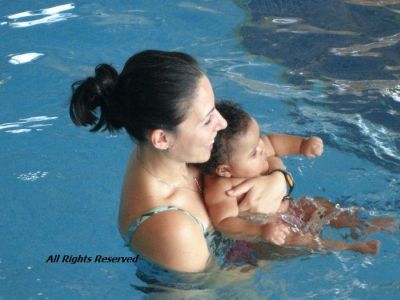I am pleased to let you know, that I am a holder of
STA Certificate in Aquatic Teaching – Baby & Pre-school (BPC)
Baby & Pre-school Teachers are qualified in the special skills required to introduce babies and very young children to aquatic activities.
The course tutor was Julie- ann James, one of the original pioneers in Baby Swimming in the UK.
I am the first Baby Water Instructor in Malta!! :))
Baby Swimming Malta on Facebook
For more pictures look here: http://www.hawanas.com/category/swimming
Why Baby Swimming
- Health Benefits
Swimming is the most beneficial form of exercise not only during pregnancy but also in the postnatal period. Regular swimming will help to maintain and improve:
- Lung capacity and function
- Joint mobility
- The cardio vascular system
- Muscles and their function
- Stamina
- Helps new mothers to control body weight and recover their pre-pregnancy body weight
- Physiological Benefits
Babies who develop their swimming abilities are often more alert for their age, with a better eating and sleeping pattern.
Babies can develop more muscles in the acquire different kinds of experiences as they move freely in the water.
They work from very early on their coordination and babies develop their sense of balance as they learn to roll and move bilaterally in the water.
- Psychological Development
Early swimming helps develop a baby’s personality.
Cautious babies learn to accept risk while.
Increases baby’s self-confident and independent.
Water offers them an early opportunity to respond to unexpected.
They develop quickly their social and expressive skills as they play in the water.
- Is it Safe for Babies to go Underwater?
The presence of an early diving reflex in the human infants has been used the routine immersion of babies in early water training programs.
It is a fact that babies upto about 6 months old hold their breath when submerged and that their bodies are designed dto automatically conserve oxygen. It is also true that when newborns are exposed to water, they make automatic swimming movements.
Two main responses are triggered when a baby goes underwater:
- The Diving Response
It is stimulated whenever a baby’s face goes in the water. Babies that are submersed for only seconds at a time, a few times per session, are not exposed to any risk.
- The “Gag Reflex”
when the water gets into a baby’s mouth, the ‘gag reflex’ causes an involuntary spasm preventing water from entering the trachea. It prevents inhalation of water into the lungs.*
*STA Baby & Pre- School 2010

1 Response to Baby Swimming